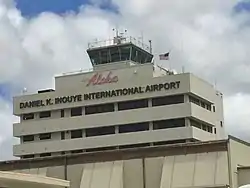Honolulu County, Hawaii
Honolulu County, officially known as the City and County of Honolulu (formerly Oahu County), is a consolidated city-county in the U.S. state of Hawaii. The city-county includes both Urban Honolulu (the state's capital and largest community) and the rest of the neighborhoods on the island of Oʻahu, as well as several minor outlying islands, including all of the Northwestern Hawaiian Islands (islands beyond Niihau) except Midway Atoll.[2]
Honolulu County | |
|---|---|
| City and County of Honolulu Kūlanakauhale a me ke Kalana o Honolulu (Hawaiian) | |
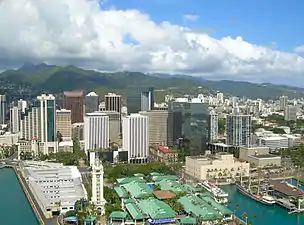 Downtown Honolulu, the city and county urban center | |
 Flag  Seal | |
| Motto(s): | |
 Location in the state of Hawaii (Northwestern Hawaiian Islands not shown) | |
| Country | United States |
| State | Hawaii |
| Incorporated | April 30, 1907[2] |
| Seat | Honolulu |
| Government | |
| • Type | Mayor–council |
| • Mayor | Rick Blangiardi (I) |
| • Council | Members[3] |
| Area | |
| • Total | 2,128 sq mi (5,510 km2) |
| • Land | 601 sq mi (1,560 km2) |
| • Water | 1,527 sq mi (3,950 km2) 71.8% |
| Population (2020) | |
| • Total | 1,016,508 |
| • Density | 1,691/sq mi (653/km2) |
| Time zone | UTC-10 (Hawaii-Aleutian Standard Time) |
| Area code | 808 |
| Website | www.honolulu.gov |
The consolidated city-county was established in the city charter adopted in 1907 and accepted by the Legislature of the Territory of Hawaii.[2] As a municipal corporation and jurisdiction it manages aspects of government traditionally exercised by both municipalities and counties in the rest of the United States.
As of the 2020 United States Census, the population was 1,016,508.[4] Because of Hawaii's municipal structure,[5] the United States Census Bureau divides Honolulu County into several census-designated places for statistical purposes.
The mayor of Honolulu County is Rick Blangiardi. The county motto is "Haʻaheo No ʻO Honolulu (Honolulu Pride)".[6] About 70% of the state's population lives in Honolulu County. Only Nevada has a higher percentage of its population living in its most populous county. 43.0% of residents identify as Asian or Asian American, the highest of any U.S. county.[7]
Geography
According to the U.S. Census Bureau, the county has a total area of 2,128 square miles (5,510 km2), of which 601 square miles (1,560 km2) is land and 1,527 square miles (3,950 km2) (71.8%) is water.[8] However, the majority of this area is the Pacific Ocean that surrounds the islands. At over 1,380 miles (2,220 km) from end to end, it is by a significant margin the widest county in the United States.
Adjacent counties
- Maui County - southeast
- Kauai County - northwest of population center
Government
Local government
Honolulu County is administered under a mayor–council system of governance overseeing municipal services: civil defense, emergency medical, fire, parks and recreation, police, sanitation, transportation, and water, among others. For 2013, the county has an annual operating budget of US$2.16 billion.[9][10]
The government of Honolulu County is has three major divisions of municipal power:
- The mayor of Honolulu is the principal executor of administrative authority. The mayor is elected on a non-partisan basis to a four-year term.
- The Honolulu City Council is the unicameral legislative body. Its elected members are responsible for drafting and passing laws, as well as budgets for various departments. The council is independent of the mayor. The nine council members each represent an administrative district (listed below) and are elected on a non-partisan basis to staggered four-year terms.
- The Prosecuting Attorney of Honolulu is charged with prosecuting criminal offenses committed within the county.[11] The prosecuting attorney is elected on a non-partisan basis to a four-year term.[12] The office is not charged with providing legal counsel to the other branches; that duty is a responsibility of the Department of Corporation Counsel, under mayoral jurisdiction.[13]
Honolulu County is divided into 36 neighborhood boards. The office of neighborhood board member is an advisory position for public policy and civil investment. Members are elected to two-year terms.
County districts
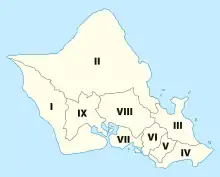
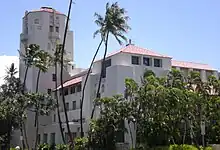
Honolulu County has nine districts, each of which elects a member of the city-county council. The boundaries of each district are revised every ten years in conjunction with the U.S. Census.
- District I: ʻEwa, ʻEwa Beach, Honouliuli, West Loch, Kapolei, Makakilo, Kalaeloa, Honokai Hale and Nanakai Gardens, Ko Olina, Nānākuli, Waiʻanae, Mākaha, Keaʻau, Mākua.
- District II: Mililani Mauka, Wahiawā, Whitmore Village, Mokulēʻia, Waialua, Haleʻiwa, Waimea, Pūpūkea, Sunset Beach, Kahuku, Lāʻie, Hauʻula, Punaluʻu, Kahana Bay, Kaʻaʻawa, Kualoa, Waiāhole, Kahaluʻu, ʻĀhuimanu, Heʻeia.
- District III: Waimānalo, Kailua, Kāneʻohe.
- District IV: Hawaiʻi Kai, Kuliʻouʻou, Niu Valley, ʻĀina Haina, Wailupe, Waiʻalae-Iki, Kalani Valley, Kāhala, Wilhelmina Rise, a portion of Kapahulu, a portion of Kaimukī, Diamond Head, Waikīkī, Ala Moana.
- District V: Kapahulu, Kaimukī, Pālolo Valley, St. Louis Heights, Mānoa, Mōʻiliʻili, McCully, Kakaʻako, Ala Moana, Makiki.
- District VI: Makiki, downtown Honolulu, Punchbowl, Liliha, Pauoa Valley, Nuʻuanu, ʻĀlewa Heights, Papakōlea, Kalihi Valley, Kalihi.
- District VII: Kalihi, Kapālama (aka Pālama), Iwilei, Sand Island, Māpunapuna, Airport, Hickam, Pearl Harbor, Ford Island, Āliamanu, Salt Lake, Foster Village, Aloha Stadium, Hālawa Valley Estates.
- District VIII: Fort Shafter, Moanalua, Hālawa, ʻAiea, Pearl City, Seaview, Crestview.
- District IX: Waikele, Waipahu, Village Park, Kunia, Mililani, Waipiʻo Gentry.
Civic center
The civic center is coextensive with what is known as the Capitol District in downtown Honolulu. The official seat of governance for the Honolulu County is located within the district at Honolulu Hale, established in the 1920s as a city hall structure and houses the chambers of the mayor of Honolulu and the Honolulu City Council. In the 1960s and 1970s, Mayor Frank Fasi developed the modern civic center as it is known today. He took controversial and aggressive measures to reclaim property, demolish massive concrete structures in the area, construct underground parking facilities and open a green campus above ground with manicured lawns and specially commissioned sculpted artwork. He also oversaw the construction of new government buildings, to house the departments that fell within mayoral jurisdiction. The most prominent of those new buildings were the Honolulu Municipal Building and Hale Makaʻi, the headquarters of the Honolulu Police Department. Civic centers were also constructed off the Capitol District campus, including the Kapiʻolani Bandstand, Neal S. Blaisdell Center, and the Waikīkī Shell.
Municipal services
The Honolulu County collects various forms of taxes, including a property tax. Revenue from those taxes is used to provide several services for the residents.
Services include:
- Honolulu Board of Water Supply
- Honolulu Fire Department
- Honolulu Emergency Medical Services
- TheBus
- Honolulu Police Department
- The Liquor Commission regulates intoxicating liquors.
State representation
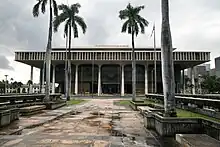
The Hawaii Department of Public Safety operates three prisons, including the Halawa Correctional Facility, the Waiawa Correctional Facility, and the Women's Community Correctional Center,[14] on the island of Oʻahu in the City and County of Honolulu.[15] In addition the Oʻahu Community Correctional Center, the jail on Oʻahu, is in the county.[16]
Federal representation
The United States Postal Service operates post offices in Honolulu County. The main one is located by the Honolulu International Airport at 3600 Aolele Street.[17] Federal Detention Center, Honolulu, operated by the Federal Bureau of Prisons, is in the CDP.[18] The Federal Bureau of Investigation (FBI) Honolulu field office is in Kapolei.[19] The Kunia Regional SIGINT Operations Center of the National Security Agency (NSA) and the Wheeler Army Airfield are in Honolulu County.
Honolulu County, like the rest of Hawaii, is a Democratic stronghold. Despite this, it tends to be the most Republican-leaning county in the state.
| Year | Republican | Democratic | Third party | |||
|---|---|---|---|---|---|---|
| No. | % | No. | % | No. | % | |
| 2020 | 136,259 | 35.66% | 238,869 | 62.51% | 6,986 | 1.83% |
| 2016 | 90,326 | 31.61% | 175,696 | 61.48% | 19,768 | 6.92% |
| 2012 | 88,461 | 29.81% | 204,349 | 68.86% | 3,932 | 1.33% |
| 2008 | 88,164 | 28.74% | 214,239 | 69.83% | 4,410 | 1.44% |
| 2004 | 144,157 | 48.29% | 152,500 | 51.08% | 1,890 | 0.63% |
| 2000 | 101,310 | 39.58% | 139,618 | 54.54% | 15,062 | 5.88% |
| 1996 | 85,779 | 33.61% | 143,793 | 56.33% | 25,684 | 10.06% |
| 1992 | 103,937 | 39.10% | 123,908 | 46.61% | 37,996 | 14.29% |
| 1988 | 120,258 | 45.97% | 138,971 | 53.13% | 2,348 | 0.90% |
| 1984 | 140,323 | 56.08% | 107,444 | 42.94% | 2,470 | 0.99% |
| 1980 | 99,596 | 44.27% | 96,472 | 42.88% | 28,927 | 12.86% |
| 1976 | 108,041 | 48.56% | 111,389 | 50.07% | 3,046 | 1.37% |
| 1972 | 132,844 | 63.32% | 76,957 | 36.68% | 0 | 0.00% |
| 1968 | 71,259 | 39.11% | 108,141 | 59.35% | 2,794 | 1.53% |
| 1964 | 33,536 | 21.58% | 121,859 | 78.42% | 0 | 0.00% |
| 1960 | 65,541 | 48.75% | 68,915 | 51.25% | 0 | 0.00% |
Demographics
| Census | Pop. | Note | %± |
|---|---|---|---|
| 1900 | 58,504 | — | |
| 1910 | 81,993 | 40.1% | |
| 1920 | 123,496 | 50.6% | |
| 1930 | 202,887 | 64.3% | |
| 1940 | 257,696 | 27.0% | |
| 1950 | 353,020 | 37.0% | |
| 1960 | 500,409 | 41.8% | |
| 1970 | 629,176 | 25.7% | |
| 1980 | 762,565 | 21.2% | |
| 1990 | 836,231 | 9.7% | |
| 2000 | 876,156 | 4.8% | |
| 2010 | 953,207 | 8.8% | |
| 2020 | 1,016,508 | 6.6% | |
| U.S. Decennial Census[21] 1790-1960[22] 1900-1990[23] 1990-2000[24] 2010-2018[4] | |||
As of the census[25] of 2010, there were 953,207 people, 311,047 households, and 217,842 families residing in Honolulu County. The population density was 1,461 inhabitants per square mile (564/km2). There were 315,988 housing units at an average density of 527 per square mile (203/km2). The racial makeup of the county was 43.9% Asian, 20.8% white, 9.5% Pacific Islander, 2.0% black or African American, 0.3% Native American, 1.1% from other races, and 22.3% from two or more races. Hispanic or Latino of any race were 9.1% of the population. The largest ancestry groups were:
- 15.7% Japanese
- 14.9% Filipino
- 5.9% German
- 5.4% Chinese
- 5.0% Native Hawaiian
- 4.4% Irish
- 3.8% English
- 3.1% Portuguese
- 2.9% Puerto Rican
- 2.3% Korean
- 2.3% Mexican
- 1.8% Samoan
- 1.8% Italian
- 1.8% Spanish
- 1.4% French
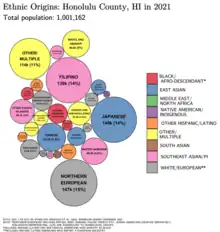
In the census of 2000, there were 286,450 households, out of which 31.8% had children under the age of 18 living with them, 54.5% were married couples living together, 12.3% had a female householder with no husband present, and 28.2% were non-families. 21.6% of all households were made up of individuals, and 7.0% had someone living alone who was 65 years of age or older. The average household size was 2.95 and the average family size was 3.46.
In the county, the population was spread out, with 23.80% under the age of 18, 10.1% from 18 to 24, 30.6% from 25 to 44, 22.0% from 45 to 64, and 13.4% who were 65 years of age or older. The median age was 36 years. For every 100 females, there were 101.1 males. For every 100 females age 18 and over, there were 99.7 males.
Metropolitan Statistical Area
The United States Office of Management and Budget has designated Honolulu County as the Urban Honolulu, HI Metropolitan Statistical Area.[26] The United States Census Bureau ranked the Urban Honolulu, HI Metropolitan Statistical Area as the 54th most populous metropolitan statistical area and the 61st most populous primary statistical area of the United States as of July 1, 2012.[27][28]
Economy
Hawaiian Airlines,[29] Island Air,[30] and Aloha Air Cargo are headquartered in the CDP.[31][32] Other major companies headquartered in Honolulu CDP include First Hawaiian Bank, Bank of Hawaii, and Hawaiian Electric Industries.
Diplomatic missions
Several countries have diplomatic missions in Honolulu:
.svg.png.webp) Australia (Consulate General)[33]
Australia (Consulate General)[33] Federated States of Micronesia (Consulate General)[34]
Federated States of Micronesia (Consulate General)[34] Japan (Consulate General)[35]
Japan (Consulate General)[35] Marshall Islands (Consulate General)[36]
Marshall Islands (Consulate General)[36] New Zealand (Consulate General)
New Zealand (Consulate General) Philippines (Consulate General)[37]
Philippines (Consulate General)[37] South Korea (Consulate General)[38]
South Korea (Consulate General)[38]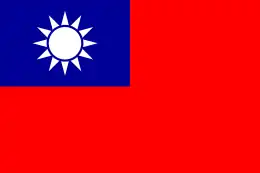 Taiwan (Economic and Cultural Office)
Taiwan (Economic and Cultural Office)
Transportation


Air
Located on the western end of the Honolulu census-designated place, Honolulu International Airport (HNL) is the principal aviation gateway to the state of Hawaii. Numerous airlines fly Pacific-wide to and from Honolulu International Airport. Locally based Hawaiian Airlines also operates flights to destinations within the islands of Hawaii and to major destinations across the Pacific.
Major highways
Public transportation
The City and County of Honolulu's Department of Transportation Services oversees two public transportation services, each operated under contract. The fare system is shared between both services and can be paid using the HOLO card.
Bus
TheBus is the transit bus service of the city and county of Honolulu. The system consists of 106 routes, including three express routes and two limited-stop routes.
In 2022, TheBus had a ridership of 38,145,000, or about 120,700 per weekday as of the second quarter of 2023. As of December 2017, TheBus is the nation’s most heavily used public transportation system per capita among major cities.[39] The system is operated in contract with the nonprofit Oahu Transit Services Inc.
Rail
Skyline is a light metro line in the city and county of Honolulu. The first 10.8-mile (17.4 km) phase of the line between East Kapolei (on the ʻEwa Plain) and Aloha Stadium, opened on June 30, 2023. The second phase, connecting to Pearl Harbor and Daniel K. Inouye International Airport before reaching Middle Street, is anticipated to open in the summer of 2025. The final phase, continuing the line across urban Honolulu to Downtown, is due to open in 2031.
Skyline was planned, designed, and constructed by the Honolulu Authority for Rapid Transportation (HART), a semi-autonomous agency of the city-county government.[40] The line is operated in contract with Hitachi Rail, who also built the railcars used on the service.
Education
Colleges and universities
Colleges and universities in Honolulu County include The University of Hawaiʻi System, consisting of University of Hawaiʻi at Mānoa, Honolulu Community College and Kapiolani Community College in the Honolulu CDP, Leeward Community College in Pearl City, University of Hawaiʻi – West Oʻahu in Kapolei, and Windward Community College in Kaneohe. University of Hawaiʻi at Mānoa houses the main offices of the University of Hawaiʻi System.[41] New Hope Christian College The private institutions serving the county include Chaminade University, Hawaii Pacific University, and Remington College (Honolulu Campus) in the Honolulu CDP and Brigham Young University–Hawaii in Laie CDP.
Primary and secondary schools
Hawaii Department of Education operates public schools in Honolulu County.[42]
Public libraries
Hawaii State Public Library System operates public libraries. The Hawaii State Library in the Honolulu CDP serves as the main library of the system,[43] while the Library for the Blind and Physically Handicapped, also in the CDP, serves disabled and blind people.[44] In addition the system operates 22 branch libraries throughout the county.[45]
Arts and culture
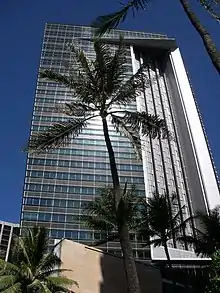
Performing arts
Established in 1900, the Honolulu Symphony is the oldest US symphony orchestra west of the Rocky Mountains. Other classical music ensembles include the Hawaii Opera Theatre. Honolulu is also a center for Hawaiian music. The main music venues include the Neal Blaisdell Center Concert Hall, the Waikiki Shell, and the Hawaii Theatre.
Honolulu also includes several venues for live theater, including the Diamond Head Theatre.
Visual arts
There are various institutions supported by the state and private entities for the advancement of the visual arts. The Honolulu Museum of Art is endowed with the largest collection of Asian and Western art in Hawaii. It also has the largest collection of Islamic art, housed at the Shangri La estate. Since the merger of the Honolulu Academy of Arts and The Contemporary Museum, Honolulu (now called the Honolulu Museum of Art Spalding House) in 2011, the museum is also the only contemporary art museum in the state. The contemporary collections are housed at main campus (Spalding House) in Makiki and a multi-level gallery in downtown Honolulu at the First Hawaiian Center. The museum hosts a film and video program dedicated to arthouse and world cinema in the museum's Doris Duke Theatre, named for the academy's historic patroness Doris Duke.
The Capitol Modern Museum is located in downtown Honolulu in No. 1 Capitol District Building and has a collection of art pieces created by local artists as well as traditional Hawaiian art. The museum is administered by the Hawaii State Foundation on Culture and the Arts.
Natural museums
Recognized internationally as the premier cultural institution of Hawaii,[46] the Bishop Museum is the largest of Honolulu's museums.[47] It is endowed with the state's largest collection of natural history specimens and the world's largest collection of Hawaiiana and Pacific culture artifacts. The Honolulu Zoo is the main zoological institution in Hawaii while the Waikiki Aquarium is a working marine biology laboratory. The Waikiki Aquarium is partnered with the University of Hawaiʻi and other universities worldwide. Established for appreciation and botany, Honolulu is home to several gardens: Foster Botanical Garden, Liliuokalani Botanical Garden, Walker Estate, among others.
Sports
Currently, Honolulu has no professional sports teams. Honolulu's Aloha Stadium was a long time host of the NFL's annual Pro Bowl from 1980 to 2016. The NCAA's Hawaii Bowl is played at Aloha Stadium annually. Games are hosted at Les Murakami and Hans L'Orange Park. Fans of spectator sports in Honolulu generally support the football, volleyball, basketball, and baseball programs of the University of Hawaiʻi at Mānoa. High school sporting events, especially football, are especially popular. Venues for spectator sports in Honolulu include:
- Aloha Stadium (American football and soccer)
- Les Murakami Stadium at the University of Hawaiʻi at Mānoa (baseball)
- Stan Sheriff Center at the University of Hawaiʻi at Mānoa (basketball and volleyball)
- Neal Blaisdell Center Arena (basketball)
Honolulu's mild climate lends itself to year-round fitness activities as well. In 2004, Men's Fitness magazine named Honolulu the fittest city in the nation. Honolulu is home to three large road races:
- The Great Aloha Run is held annually on Presidents' Day.
- The Honolulu Marathon, held annually on the second Sunday in December, draws more than 20,000 participants each year, about half to two thirds of them from Japan.
- The Honolulu Triathlon is an Olympic distance triathlon event governed by USA Triathlon. Held annually in May since 2004, there is an absence of a sprint course.
Media
Honolulu County is home to numerous forms media including newspapers, magazines, radio and television.
Communities
Census-designated places
- ʻĀhuimanu
- ʻAiea
- East Honolulu
- East Kapolei
- ʻEwa Beach
- ʻEwa Gentry
- ʻEwa Villages
- Hālawa
- Haleʻiwa
- Hauʻula
- Helemano
- Heʻeia
- Hickam Housing
- Honolulu
- Iroquois Point
- Kaʻaʻawa
- Kahaluʻu
- Kahuku
- Kailua
- Kalaeloa
- Kāneʻohe
- Kaneohe Base (Marine Corps Base Hawaiʻi)
- Kapolei
- Kawela Bay
- Ko Olina
- Lāʻie
- Māʻili
- Mākaha
- Mākaha Valley
- Makakilo
- Maunawili
- Mililani Mauka
- Mililani Town
- Mokulēʻia
- Nānākuli
- Ocean Pointe
- Pearl City
- Punaluʻu
- Pūpūkea
- Royal Kunia (formerly Village Park)
- Schofield Barracks
- Wahiawā
- Waiāhole
- Waialua
- Waiʻanae
- Waikāne
- Waikele
- Waimalu
- Waimānalo
- Waimānalo Beach
- Waipahu
- Waipiʻo
- Waipiʻo Acres
- West Loch Estate
- Wheeler Army Airfield
- Whitmore Village
Other places
Sister cities
Honolulu's sister cities are:[48]
 Baguio, Philippines, 1991
Baguio, Philippines, 1991 Baku, Azerbaijan, 1998
Baku, Azerbaijan, 1998 Bruyères, France, 1960
Bruyères, France, 1960 Cali, Colombia, 2012
Cali, Colombia, 2012 Candon, Philippines, 2015
Candon, Philippines, 2015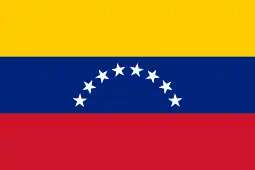 Caracas, Venezuela, 1990
Caracas, Venezuela, 1990 Cebu City, Philippines, 1990
Cebu City, Philippines, 1990 Chengdu, China, 2011
Chengdu, China, 2011 Chigasaki, Japan, 2014
Chigasaki, Japan, 2014 Fengxian (Shanghai), China, 2012
Fengxian (Shanghai), China, 2012 Funchal, Portugal, 1979
Funchal, Portugal, 1979 Fuzhou, China, 2021[49]
Fuzhou, China, 2021[49] Haikou, China, 1985
Haikou, China, 1985 Noreña, Spain, 1960
Noreña, Spain, 1960 Hiroshima, Japan, 1959
Hiroshima, Japan, 1959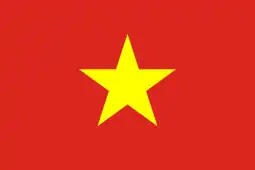 Huế, Vietnam, 1995
Huế, Vietnam, 1995 Incheon, South Korea, 2003
Incheon, South Korea, 2003 Kaohsiung, Taiwan, 1962
Kaohsiung, Taiwan, 1962 Kyzyl, Russia, 2004
Kyzyl, Russia, 2004 Laoag, Philippines, 1969
Laoag, Philippines, 1969 Majuro, Marshall Islands, 2001
Majuro, Marshall Islands, 2001 Mandaluyong, Philippines, 2005
Mandaluyong, Philippines, 2005 Manila, Philippines, 1980
Manila, Philippines, 1980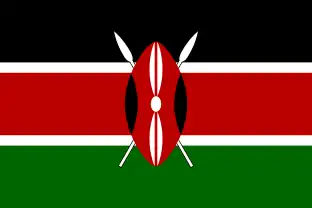 Mombasa, Kenya, 2000
Mombasa, Kenya, 2000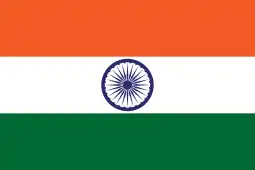 Mumbai, India, 1970
Mumbai, India, 1970 Nagaoka, Japan, 2012
Nagaoka, Japan, 2012 Naha, Japan, 1960
Naha, Japan, 1960 Qinhuangdao, China, 2010
Qinhuangdao, China, 2010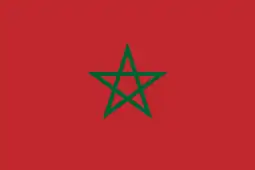 Rabat, Morocco, 2007
Rabat, Morocco, 2007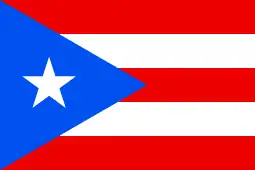 San Juan, Puerto Rico, 1985
San Juan, Puerto Rico, 1985 Seoul, South Korea, 1973
Seoul, South Korea, 1973 Sintra, Portugal, 1998
Sintra, Portugal, 1998 Uwajima, Japan, 2004
Uwajima, Japan, 2004 Vigan, Philippines, 2003
Vigan, Philippines, 2003 Yamaguchi, Japan, 2022
Yamaguchi, Japan, 2022 Zhangzhou, China, 2012
Zhangzhou, China, 2012 Zhongshan, China, 1997
Zhongshan, China, 1997
See also
References
- "Events, Official Web Site for The City and County of Honolulu." City and County of Honolulu. Retrieved October 14, 2008.
- "About the City and County of Honolulu". City and County of Honolulu. Archived from the original (Government website) on October 12, 2004. Retrieved August 2, 2013.
- "Council Members". Honolulu City Council. City & County of Honolulu. Retrieved February 22, 2018.
- "2020 Population and Housing State Data". United States Census Bureau. Retrieved August 12, 2021.
- "Cities with 100,000 or More Population in 2000 ranked by Population per Square Mile, 2000 in Alphabetic Order". United States Census Bureau, Population Division. July 10, 2008. Archived from the original on December 26, 2002. Retrieved July 13, 2008.
- "Events, Official Web Site for The City and County of Honolulu." City and County of Honolulu. Retrieved October 14, 2008.
- "2020 Census Demographic Data Map Viewer". Retrieved July 12, 2022.
- "US Gazetteer files: 2010, 2000, and 1990". United States Census Bureau. February 12, 2011. Retrieved April 23, 2011.
- Grube, Nick (June 21, 2013). "Caldwell: Brace for Cuts in Honolulu City Services". Honolulu Civil Beat. Peer News. Retrieved October 20, 2013.
- Pang, Gordon Y.K. (June 22, 2013). "Budget bills pass after Caldwell refuses to sign". Honolulu Star-Advertiser. Retrieved October 20, 2013. (subscription required)
- "Department of the Prosecuting Attorney: Welcome". HonoluluProsecutor.com. 2013. Archived from the original on September 25, 2013. Retrieved October 20, 2013.
- "Department of the Prosecuting Attorney: About". HonoluluProsecutor.com. 2013. Archived from the original on September 25, 2013. Retrieved October 20, 2013.
- "Department of the Corporation Counsel". Honolulu.gov. September 24, 2013. Archived from the original on October 21, 2013. Retrieved October 20, 2013.
- "Prisons." Hawaii Department of Public Safety. Retrieved May 19, 2010.
- "Institutions Division." Hawaii Department of Public Safety. Retrieved May 19, 2010.
- "Oʻahu Community Correctional Center." Hawaii Department of Public Safety. Retrieved May 19, 2010.
- "Post Office Location - HONOLULU." United States Postal Service. Retrieved May 21, 2009.
- "FDC Honolulu Contact Information." Federal Bureau of Prisons. Retrieved December 30, 2009.
- "Honolulu Division." Federal Bureau of Investigation. Retrieved on June 9, 2015. "91-1300 Enterprise Street Kapolei, HI 96707"
- Leip, David. "Dave Leip's Atlas of U.S. Presidential Elections". uselectionatlas.org. Retrieved May 26, 2017.
- "U.S. Decennial Census". United States Census Bureau. Retrieved June 28, 2014.
- "Historical Census Browser". University of Virginia Library. Retrieved June 28, 2014.
- "Population of Counties by Decennial Census: 1900 to 1990". United States Census Bureau. Retrieved June 28, 2014.
- "Census 2000 PHC-T-4. Ranking Tables for Counties: 1990 and 2000" (PDF). United States Census Bureau. Retrieved June 28, 2014.
- "U.S. Census website". United States Census Bureau. Retrieved January 31, 2008.
- "OMB Bulletin No. 13-01: Revised Delineations of Metropolitan Statistical Areas, Micropolitan Statistical Areas, and Combined Statistical Areas, and Guidance on Uses of the Delineations of These Areas" (PDF). Office of Management and Budget. February 28, 2013. Archived (PDF) from the original on January 21, 2017. Retrieved March 20, 2013 – via National Archives.
- "Table 1. Annual Estimates of the Population of Metropolitan and Micropolitan Statistical Areas: April 1, 2010 to July 1, 2012". 2012 Population Estimates. United States Census Bureau, Population Division. March 2013. Archived from the original (CSV) on April 1, 2013. Retrieved March 20, 2013.
- "Table 2. Annual Estimates of the Population of Combined Statistical Areas: April 1, 2010 to July 1, 2012". 2012 Population Estimates. United States Census Bureau, Population Division. March 2013. Archived from the original (CSV) on May 17, 2013. Retrieved March 20, 2013.
- "Corporate Headquarters." Hawaiian Airlines. Retrieved May 20, 2009.
- "Contact Information Archived June 5, 2009, at the Wayback Machine." Island Air. Retrieved May 20, 2009.
- "Locations Archived May 22, 2009, at the Wayback Machine." Aloha Air Cargo. Retrieved May 21, 2009.
- "Honolulu CDP, HI Archived February 18, 2008, at the Wayback Machine." U.S. Census Bureau. Retrieved May 21, 2009.
- "Australian Consulate-General in Honolulu, United States of America Archived December 22, 2008, at the Wayback Machine." Department of Foreign Affairs and Trade. Retrieved January 10, 2009.
- "Department of Foreign Affairs, Overseas Embassies, Consulates, and Missions." Department of Foreign Affairs (Federated States of Micronesia). Retrieved January 10, 2009.
- "Visa & Travel Archived November 3, 2008, at the Wayback Machine." Consulate-General of Japan in Honolulu. Retrieved August 17, 2008.
- "Foreign Mission Archived June 25, 2011, at the Wayback Machine." Republic of the Marshall Islands. Retrieved January 28, 2009.
- "Other Philippine Missions in the U.S.." Consulate-General of the Philippines in Chicago. Retrieved January 10, 2009.
- "Location Archived December 11, 2008, at the Wayback Machine." Consulate-General of South Korea in Honolulu. Retrieved January 10, 2009.
- Honore, Marcel (December 6, 2017). "Why Are Fewer People Riding TheBus?". Honolulu Civil Beat. Archived from the original on March 27, 2023. Retrieved June 25, 2023.
- "About". Honolulu Authority for Rapid Transportation. Archived from the original on June 1, 2023. Retrieved June 19, 2023.
- Magin, Janis L. "Land deals could breathe new life into Moiliili." Pacific Business News. Sunday July 1, 2007. 1. Retrieved October 5, 2011. "Dobelle at that time had even suggested moving the University of Hawaiʻi system offices from the Mānoa campus to office space in Moiliili, something the current administration is not actively considering."
- "2020 CENSUS - SCHOOL DISTRICT REFERENCE MAP: Honolulu County, Hawaii" (PDF). U.S. Census Bureau. Retrieved July 22, 2022. - Text list
- "Hawaii State Library Archived April 13, 2009, at the Wayback Machine." Hawaii State Public Library System. Retrieved May 22, 2009.
- "Library for the Blind and Physically Handicapped Archived May 28, 2009, at the Wayback Machine." Hawaii State Public Library System. Retrieved May 22, 2009.
- "Library Locations Archived May 13, 2009, at the Wayback Machine." Hawaii State Public Library System. Retrieved May 22, 2009.
- Hoover, Will (May 25, 2009). "Hawaii's Bishop Museum struggles to survive recession". Honolulu Advertiser. Retrieved October 20, 2013.
- "Bishop Museum: About Us". BishopMuseum.org. Archived from the original on October 24, 2013. Retrieved October 20, 2013.
- "International Relations and Sister-City Program" (official website). City and County of Honolulu. 2019. Retrieved November 19, 2019.
- "Fuzhou, Honolulu forge sister-city ties". news.cn. Xinhua. October 22, 2021. Retrieved April 25, 2022.
